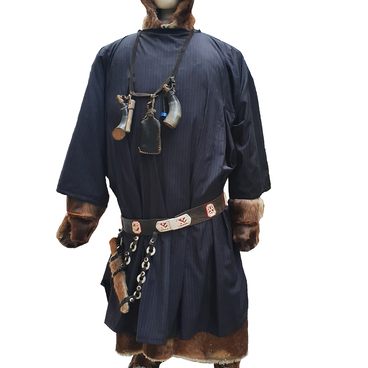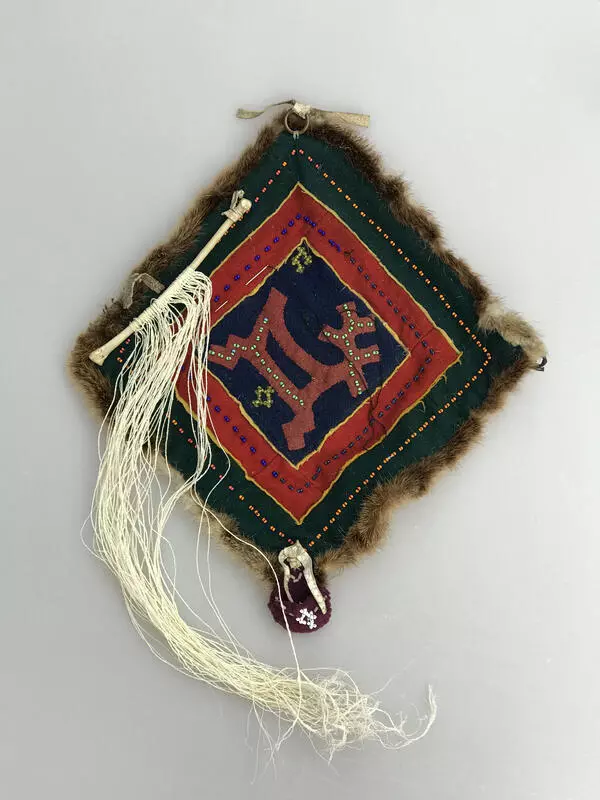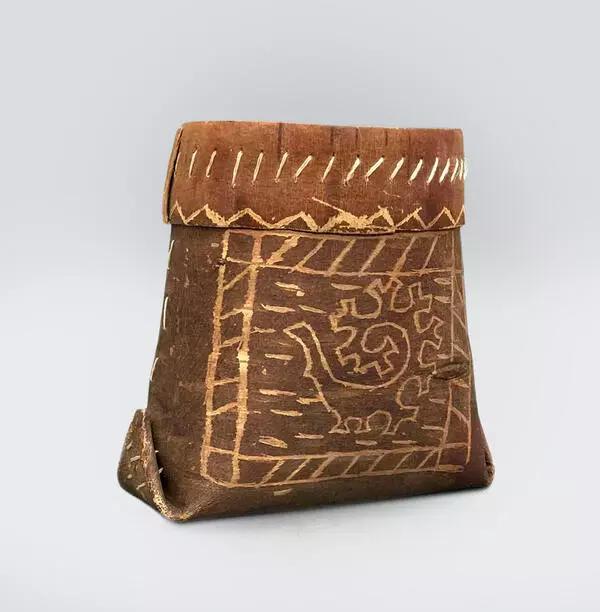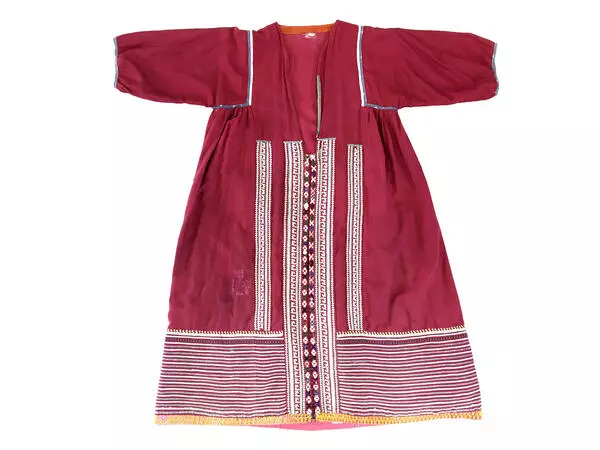Ritual mittens are worn by performers of sacred prayer-songs during the sacred holiday of the Khanty people, which is called ‘Bear Games’. Men wear such mittens, while women sew them during the waxing moon. The ‘Bear’ pattern of these mittens is prohibited to be used in decorating everyday clothes or household items.
The Khanty and Mansi people revere the bear as a sacred animal and worship it. These peoples have a legend about the Bear, who was the son of the supreme God Torum. As a child, he lived in the sky, but he was irresistibly attracted to the world of people. Torum yielded to the requests of his son and put him down on the ground in a cradle, telling him to observe order and justice and not to harm people. However, the Bear violated his father’s order and was turned into a beast.
Since then, any Khanty hunter has the right to kill a bear. But in this case, he is obliged to return the immortal soul of his son to the great Torum. To do this, one needs to hold a special ceremony, which marks the beginning of the “Bear games”.
In the Khanty language, this holiday is called “Pupi Yak”, which means “a bear dance”. The duration of the holiday depends on the gender of the bear. If it is a male, then it lasts for five days, and if a female one, the holiday is celebrated for four days.
The Khanty people believe that the bear is a man’s relative, so it has the same number of souls as humans, five souls for a man and four for a woman.
The hunters, who have killed a bear, determine the date of the games. They invite residents of the village and nearby camps. Performers of sacred dances and songs do not need an invitation. Every guest must bring a treat for the bear.
The ceremony usually begins around lunchtime and ends in the morning. The holiday is preceded by fortune-telling that is done with the help of the head of the dead bear. One of the participants asks questions about the upcoming ritual and raises the bear’s head. If it rises easily, then the bear answers “no”. If it rises with difficulty, then the spirit agrees. Thus, the Khanty people find out how many deer should be sacrificed during the holiday and whether the killed bear remains the family’s patron.
Every morning, the Khanty sing the ‘song of awakening’ in front of the animal’s head and bring food, shawls, and skins to the animal. Then the Khanty perform several rituals, ritual songs, dances, and act out various skits. Every day of the holiday has its own sacred meaning. For example, the Khanty believe that great spirits come to the festival on the last night. At the end of each day of the festival, they sing a song that puts a bear to sleep and throw a headscarf over his head.
The Khanty and Mansi people revere the bear as a sacred animal and worship it. These peoples have a legend about the Bear, who was the son of the supreme God Torum. As a child, he lived in the sky, but he was irresistibly attracted to the world of people. Torum yielded to the requests of his son and put him down on the ground in a cradle, telling him to observe order and justice and not to harm people. However, the Bear violated his father’s order and was turned into a beast.
Since then, any Khanty hunter has the right to kill a bear. But in this case, he is obliged to return the immortal soul of his son to the great Torum. To do this, one needs to hold a special ceremony, which marks the beginning of the “Bear games”.
In the Khanty language, this holiday is called “Pupi Yak”, which means “a bear dance”. The duration of the holiday depends on the gender of the bear. If it is a male, then it lasts for five days, and if a female one, the holiday is celebrated for four days.
The Khanty people believe that the bear is a man’s relative, so it has the same number of souls as humans, five souls for a man and four for a woman.
The hunters, who have killed a bear, determine the date of the games. They invite residents of the village and nearby camps. Performers of sacred dances and songs do not need an invitation. Every guest must bring a treat for the bear.
The ceremony usually begins around lunchtime and ends in the morning. The holiday is preceded by fortune-telling that is done with the help of the head of the dead bear. One of the participants asks questions about the upcoming ritual and raises the bear’s head. If it rises easily, then the bear answers “no”. If it rises with difficulty, then the spirit agrees. Thus, the Khanty people find out how many deer should be sacrificed during the holiday and whether the killed bear remains the family’s patron.
Every morning, the Khanty sing the ‘song of awakening’ in front of the animal’s head and bring food, shawls, and skins to the animal. Then the Khanty perform several rituals, ritual songs, dances, and act out various skits. Every day of the holiday has its own sacred meaning. For example, the Khanty believe that great spirits come to the festival on the last night. At the end of each day of the festival, they sing a song that puts a bear to sleep and throw a headscarf over his head.





